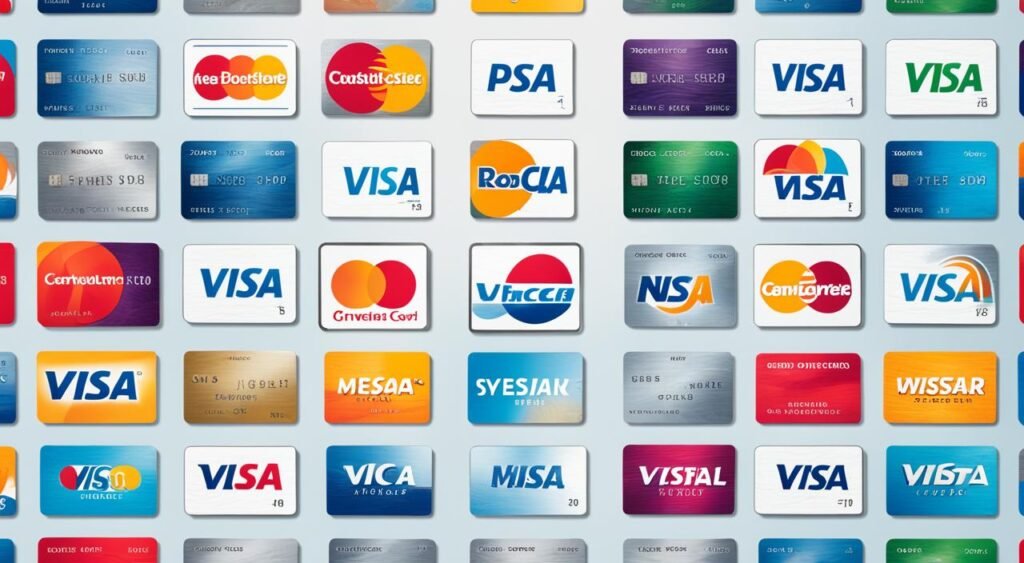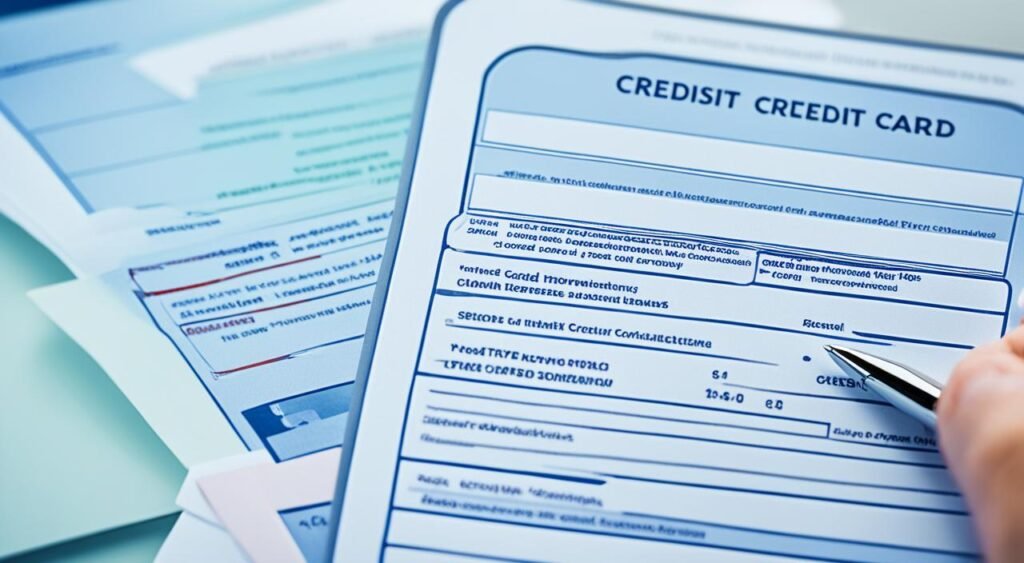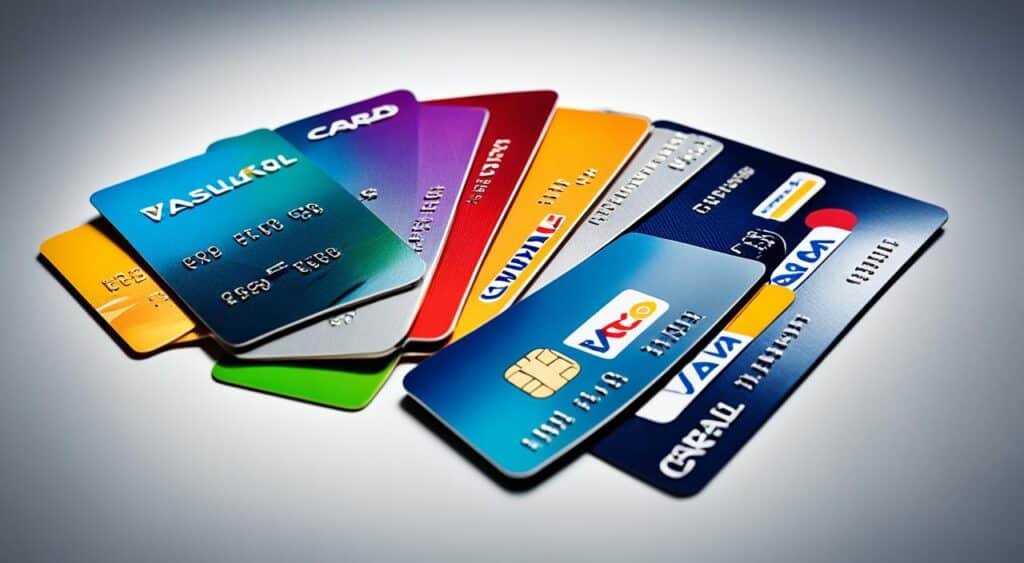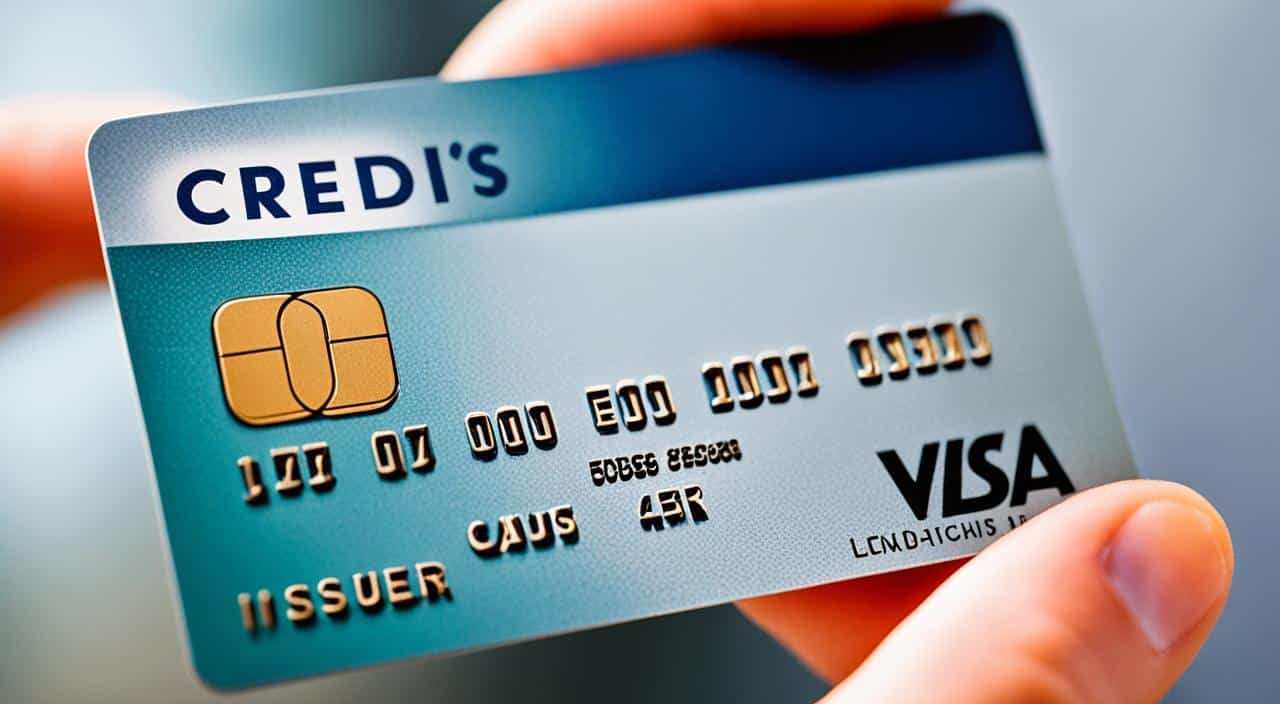What Is a Credit Card Issuer?
A credit card issuer is a financial institution like a bank or credit union. They offer credit cards to people. Issuers handle things like approving applications and setting rules for the card. They also manage the credit card account.
They work with credit card networks like Visa and Mastercard. This helps with transactions between merchants and cardholders. Credit card issuers set things like credit limits, interest rates, and rewards. They are key in the credit card industry.
Key Takeaways
- A credit card issuer is a financial institution that offers credit cards to consumers.
- Issuers are responsible for extending credit, approving applications, and managing the overall credit card account.
- Credit card issuers work with networks like Visa and Mastercard to facilitate transactions between merchants and cardholders.
- Issuers determine cardholders’ credit limits, interest rates, rewards, and other features.
- Credit card issuers play a crucial role in the credit card industry.
Introduction to Credit Card Issuers
Credit card issuers are key in the financial world. They give people access to credit and help with transactions between merchants and cardholders. These lenders handle many tasks, like checking creditworthiness and managing credit card accounts.
Overview of Credit Card Issuers
Credit card issuers are the banks that give out credit cards to people. They look at credit applications, decide if they get approved, and manage the account activities. Issuers work with networks like Visa and Mastercard to process transactions and offer protections and benefits to cardholders.
Key Roles of Credit Card Issuers
The main jobs of credit card issuers include:
- Paying merchants for purchases made with the issuer’s credit cards
- Gathering payments from cardholders and handling their accounts
- Deciding if to approve or deny credit card applications based on creditworthiness
- Setting the rules of the credit card, like interest rates, fees, and credit limits
- Choosing the benefits and rewards for cardholders
- Sending out physical credit cards to those who get approved
- Offering customer service and support to cardholders
- Reporting account activity to credit bureaus, which affects the cardholder’s credit score
Knowing what credit card issuers do helps consumers make better choices about their cards. This way, they can find cards that fit their financial needs.
Credit Card Issuer

A credit card issuer is a financial institution like a bank or credit union. They offer credit cards to people. Issuers handle credit, approve applications, set card terms, and manage the account.
Types of Credit Card Issuers
The main kinds of credit card issuers are:
- Banks (e.g., Chase, Bank of America, Wells Fargo)
- Credit unions
- Specialized credit card companies (e.g., American Express, Discover)
These credit card issuing companies offer different credit card provider products. Each has its own features, benefits, and rules.
| Issuer Type | Examples | Key Characteristics |
|---|---|---|
| Banks | Chase, Bank of America, Wells Fargo | They have a wide range of credit card products and often more banking services. |
| Credit Unions | Navy Federal Credit Union, Pentagon Federal Credit Union | They serve a specific group of people and may offer more personal service. |
| Specialized Credit Card Companies | American Express, Discover | They focus only on credit cards and have unique rewards and benefits. |
The definition of a credit card issuer is a financial institution that gives credit cards to people. They manage the credit card account and set the rules. The types of credit card issuers include banks, credit unions, and companies that specialize in credit cards. Each offers different credit card products with their own special features and benefits.
How Credit Card Issuers Work

When you apply for a credit card, the credit card issuer checks if you’re a good candidate. They look at your credit score and credit history. They decide if you get the card, what credit limit and interest rate you’ll get. They also set the terms and conditions, like annual fees, rewards programs, and other features.
Credit Card Application and Approval Process
The credit card application process has a few steps:
- You fill out a credit card application with your personal and financial details.
- The credit card issuer looks at your credit card issuer approval criteria, like your credit score and credit history.
- They decide if you get approved and what credit card terms, fees, and limits you’ll get.
- You review and agree to the credit card agreement.
Credit Card Terms, Fees, and Limits
Credit card issuers set the terms of the credit card. This includes the annual percentage rate (APR), annual fees, balance transfer fees, late payment fees, and credit limits. These are all in the credit card agreement you agree to when you open the account. Issuers can change these credit card issuer policies based on your creditworthiness and the market.
| Credit Card Term | Description |
|---|---|
| Annual Percentage Rate (APR) | The interest rate charged on the outstanding balance |
| Annual Fee | A fee charged annually for holding the credit card |
| Balance Transfer Fee | A fee charged for transferring a balance from another card |
| Late Payment Fee | A fee charged for making a payment after the due date |
| Credit Limit | The maximum amount you can borrow on the credit card |
Benefits and Features Offered by Credit Card Issuers
Credit card issuers offer many benefits and features to make their cards more valuable. These credit card issuer benefits and credit card issuer features include rewards programs, fraud protection, credit monitoring, purchase protection, and travel perks.
Rewards programs are a big perk. Cardholders earn cash back, points, or miles for their purchases. These rewards can be used for statement credits, gift cards, or travel expenses. This makes using a credit card more rewarding and encourages people to choose that card.
Credit card issuers also provide protection and help. They protect against unauthorized charges and monitor for suspicious activity. They offer purchase protection and extended warranties on items. This adds an extra layer of security for consumers.
For those who travel a lot, credit card issuers offer special benefits. These include airline lounge access, priority boarding, and rental car insurance. These credit card issuer features make traveling with the card more convenient and enjoyable.
| Credit Card Issuer Benefit | Description |
|---|---|
| Rewards Programs | Earn cash back, points, or miles for purchases |
| Fraud Protection | Safeguard against unauthorized charges |
| Credit Monitoring | Detect and address suspicious account activity |
| Purchase Protection | Extend warranties and safeguard eligible purchases |
| Travel Perks | Airline lounge access, priority boarding, rental car insurance |
“Credit card issuers are constantly looking for ways to differentiate their products and provide added value to consumers. These benefits and features are a key part of that strategy.”
Comparison of Major Credit Card Issuers

When looking at credit cards, there are many options from different issuers. American Express, Discover, Chase, and Capital One are top names in the market. Each offers special features and benefits for different spending habits and preferences.
American Express
American Express is famous for its premium features and benefits. The American Express Platinum Card is a hit with travelers. It gives access to airport lounges, better hotel and car rental deals, and big rewards on travel buys. American Express is also known for its strong fraud protection and top-notch customer service.
Discover
Discover is known for its easy-to-understand approach. Discover cards are famous for their big cash back rewards, no annual fees, and strong fraud protection. If you want a simple credit card with great value, Discover is a top choice.
Chase
Chase is a big name in credit cards in the U.S. with a wide range of credit card products. The Chase Sapphire Preferred and Chase Freedom cards are favorites for their great rewards programs, big sign-up bonuses, and wide travel benefits. Chase is known for its innovation and focus on the customer, making it a popular pick.
Capital One
Capital One is a company that offers financial services and is also a credit card issuer. The Venture Rewards and Quicksilver cards are highlights, offering travel rewards, cash back, and other great features. Capital One is known for its use of technology and personalized service, appealing to tech-savvy consumers.
Choosing a credit card issuer depends on your spending, travel needs, and financial goals. By looking at the features and benefits of each major credit card issuer, you can pick the one that fits your life best.
Also Read: What Are The Different Types Of Credit And Why Do They Matter?
Conclusion
Credit card issuers are key in the credit card world. They give out credit, check applications, set rules, and manage accounts. Knowing about credit card issuers helps people pick the right card for their money needs and goals.
The key takeaways on credit card issuers are important for consumers. These issuers offer benefits like rewards and protection against fraud. By looking into what different issuers offer, people can find a card that fits their spending and financial plans.
It doesn’t matter if you’re new to credit cards or have been using them for years. It’s important to know about credit card issuers and what they offer. This knowledge helps people use their credit cards wisely, getting the most benefits and avoiding risks.
FAQs
Q: What is a credit card issuer?
A credit card issuer is a financial institution like a bank or credit union. They offer credit cards to people. They handle the credit, approve applications, set the card’s terms, and manage the account.
Q: What are the key responsibilities of credit card issuers?
Issuers pay merchants for transactions and collect payments from cardholders. They approve or deny credit card applications. They set the card’s terms, offer benefits and rewards, and distribute cards.
They also provide customer service and report account activity to credit bureaus.
Q: What are the major types of credit card issuers?
Major issuers include banks like Chase, Bank of America, and Wells Fargo. Credit unions and specialized companies like American Express and Discover are also issuers. Each offers different credit cards with unique features and terms.
Q: How do credit card issuers determine the terms and conditions of a credit card?
Issuers set the credit card’s terms, like the APR, fees, and limits. These are in the credit card agreement cardholders agree to. Issuers can change these based on the cardholder’s credit and market conditions.
Q: What benefits and features do credit card issuers offer?
Issuers offer rewards programs, fraud protection, credit monitoring, and travel perks. These benefits aim to make the card more valuable and encourage use.
Q: How do major credit card issuers like American Express, Discover, Chase, and Capital One differ?
American Express is known for its travel and dining benefits, fraud protection, and customer service. Discover cards offer cash back rewards, no annual fees, and strong fraud protection.
Chase is known for its rewards programs, sign-up bonuses, and travel benefits. Capital One has a variety of cards, including Venture Rewards and Quicksilver, with travel rewards and cash back.
Source Links
- https://www.capitalone.com/learn-grow/money-management/credit-card-issuer/
- https://www.cnbc.com/select/credit-card-network-vs-card-issuer-difference/
- https://www.chase.com/personal/credit-cards/education/basics/what-is-a-credit-card-issuer
